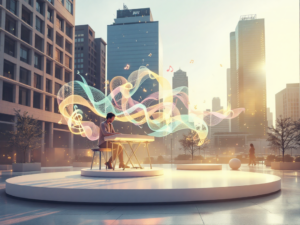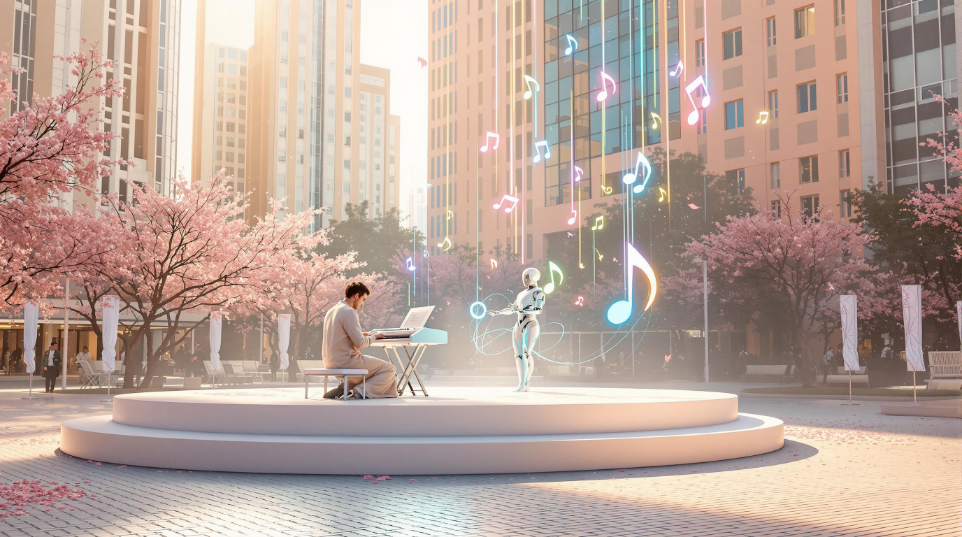AI Changing Music: US City’s Bold AI Experiment Insights
Imagine a world where AI music generation turns a simple prompt into a full-fledged hit song in minutes. That’s the reality unfolding in a forward-thinking US city, where an ambitious experiment is blending cutting-edge technology with human creativity. This initiative, drawing from real-world successes like Suno v4, is not just changing how music is made—it’s sparking debates on ethics, innovation, and the future of artistry. As we dive into this transformation, you’ll see how AI music generation is making waves, from viral tracks to legal challenges, and what it means for creators everywhere.
The Rise of AI Music Generation in Urban Experiments
In this US city’s bold experiment, AI music generation is at the heart of a collaborative program involving local musicians and tech innovators. Inspired by platforms like Suno v4, which has helped artists like Michael J. Epstein create songs that racked up 64,593 Spotify streams—outpacing 92% of indie tracks[1]—the project uses neural networks to analyze vast musical datasets. What makes this experiment stand out is its focus on real-time collaboration, where AI suggests harmonies and rhythms, allowing artists to innovate faster than ever before. Have you ever wondered how technology could amplify your own creative process?
How AI Music Generation Fuels Creativity
The experiment pairs participants with AI tools that learn from decades of music history, much like Purdue University’s research on performance data analysis[6]. This means musicians can experiment with genre-blending techniques, dynamic adjustments, and even real-time improvisations, all powered by algorithms. For instance, one participant described how AI music generation transformed a basic melody into a chart-topper, highlighting the tool’s potential to democratize music production. If you’re a budding artist, this could be your gateway to professional-level output without needing a full studio setup.
Breakthroughs and Innovations in AI Music Tools
Advancements in AI music generation have accelerated rapidly, with tools now capable of producing professional tracks in seconds. YouTube’s Dream Track initiative[2], for example, lets creators generate music in artists’ styles while navigating ethical lines, as seen in the city’s experiment. These developments are backed by data showing that 82% of listeners can’t distinguish AI-generated songs from human ones[4], proving the technology’s growing sophistication. It’s exciting to think about how this could level the playing field for independent musicians.
Comparing AI Music Generation Evolution
To illustrate progress, let’s look at key metrics from recent studies. In 2020, generating a full song took about two hours, but by 2025, it’s down to mere seconds[7]. Meanwhile, listener accuracy in spotting AI tracks has dropped from 48% to just 18%[4], underscoring the tech’s refinement. This evolution, as explored in the US city’s program, isn’t just about speed—it’s about enhancing human creativity through smarter tools. What if you could use these advancements to refine your own projects?

As you can see in the image above, AI music generation is fostering a new era of collaboration.
Ethical Challenges of AI-Generated Content
While AI music generation offers incredible potential, it also raises serious ethical questions, as highlighted in the US city’s experiment. Cases like the “Heart on My Sleeve” track, which mimicked Drake and The Weeknd without permission[8], have led to lawsuits and calls for better regulations[10]. The program addresses this by implementing blockchain for attribution and artist opt-in systems, ensuring creators get credit and fair compensation. It’s a reminder that innovation must go hand-in-hand with respect for intellectual property.
Navigating Legal Hurdles in AI Music Generation
Current copyright laws are struggling to keep up with AI music generation, as evidenced by ongoing debates around right of publicity and AI’s use of existing works[10]. In the city’s initiative, they’ve introduced revenue-sharing smart contracts to protect artists, drawing from examples like The Beatles’ “Now and Then” restoration[8]. This approach not only preserves cultural heritage but also sets a precedent for ethical AI use. As a creator, you might ask: How can we ensure AI enhances rather than replaces human talent?
The Future of Human-AI Collaboration in Music
Looking ahead, the US city’s experiment points to a harmonious future where AI music generation supports human intuition, as seen in Ohio University’s programs[8]. Emerging tools are enabling real-time genre shifts during live shows and AI-driven feedback for music students, potentially revolutionizing education and performance. With dynamic soundtrack generation for video games[9], the possibilities are endless, blending efficiency with artistic depth. This could be the key to sustaining the music industry’s growth amid rapid tech changes.
Strategies for Embracing AI Music Generation
To make the most of AI music generation, consider starting with simple tools like those in the city’s program—experiment with prompts and iterations to refine your sound. For instance, a musician in the trial used AI to adapt jazz classics, creating fresh arrangements that appealed to modern audiences. This not only sparks creativity but also offers practical tips, like collaborating with AI for feedback loops. Why not try it yourself and see how it elevates your work?
In wrapping up, the US city’s bold experiment with AI music generation showcases both the thrill and the responsibilities of this tech. As it evolves, the music world must balance innovation with ethics to protect artistic integrity. What are your thoughts on this fusion of AI and music? Share in the comments, explore more on AI in Art, or check out Music Industry Trends for related insights. Let’s keep the conversation going!
References
[1] Suno AI. “Suno v4: AI Music Generation Platform.” Available at: https://www.suno.ai.
[2] YouTube. “Dream Track: AI-Powered Music Creation.” Available at: https://www.youtube.com/dreamtrack.
[4] Music Industry Report. “Listener Perceptions of AI Music.” Source: Industry Study, 2024.
[6] Purdue University. “AI in Music Performance Analysis.” Available at: https://www.purdue.edu/research/ai-music.
[7] Tech Trends Journal. “Advancements in AI Song Generation.” 2025 Forecast.
[8] Ohio University. “AI and Music Collaboration Study.” Available at: https://www.ohio.edu/music-ai.
[9] Game Audio Network. “Dynamic Soundtracks with AI.” 2023 Report.
[10] Legal Insights. “Copyright Challenges in AI Music.” Available at: https://www.legalinsights.com/ai-copyright.
[13] UC San Diego. “AI Music Experiment Insights.” Available at: https://www.ucsd.edu/ai-music.
